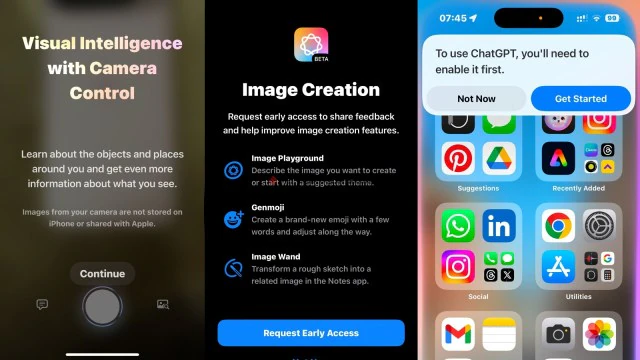For the very first time, the beta release introduces a multitude of eagerly anticipated Apple Intelligence features that were previewed by Apple at its developer conference in June.
Apple introduced a beta edition of its software on Thursday, showcasing fresh Apple Intelligence functionalities such as the highly anticipated ChatGPT integration. Nevertheless, this remains a preview meant for developers and is not yet ready for general release. Apple Intelligence has been undergoing previews for several months now, and it is anticipated that the initial set of Apple Intelligence features will be accessible to the public possibly as soon as next week through iOS 18.1.
Among the latest developments showcased at the recent Apple developer conference is a sneak peek into the upcoming generative artificial intelligence capabilities. Noteworthy features such as Genmoji, Image Playground, Visual Intelligence with Camera Control, and compatibility with OpenAI’s ChatGPT were unveiled. Particularly interesting, Genmoji and Image Playground empower users to craft images directly on their devices for sharing via Messages.
One of the most highly anticipated aspects of Apple Intelligence is its seamless integration with ChatGPT. When presenting Siri with a complex inquiry, your device will offer the choice to “Utilize ChatGPT?”—a decision that you can either approve or reject. Opting in will result in your question being channeled through this generative AI service, and the corresponding answer will appear directly on your device. This functionality will be accessible to all users at no cost, while individuals subscribed to the paid version of ChatGPT can link their accounts to Apple products for added advantages. Furthermore, ChatGPT will play a central role in refining writing and image-generation capabilities, in addition to fueling a novel attribute known as Visual Intelligence, allowing the phone’s camera to recognize text or objects and provide real-time translations for signs.
Apple’s initial release of Apple Intelligence, its proprietary AI technology seamlessly integrated across its operating systems, might appear lackluster initially. Nonetheless, what sets Apple apart is its capability to deploy these features across a vast array of devices. Initially revealed in June with compatibility limited to just two iPhone models, a few iPads, and Macs equipped with Apple’s custom silicon, the scope of Apple Intelligence has since expanded. The latest iPhone 16 iterations, all iPad versions – including the recently unveiled iPad mini, and Mac computers now fully embrace Apple Intelligence. Anticipated announcements of forthcoming M4-Macs will also include support for Apple Intelligence, with the enhanced processors expected to further accelerate AI operations.
Apple has surpassed competitors like Google and Samsung by leveraging the cutting-edge Apple Intelligence technology embedded in the most recent iterations of iOS, iPadOS, and macOS. Despite Google and Samsung taking the lead in introducing novel AI functionalities, they fall short in achieving the level of seamless integration that Apple offers in its hardware, software, and services.
Apple’s performance in the Artificial Intelligence race has impressed investors, leading to a favorable response from Wall Street towards the tech giant. Despite this, doubts linger regarding Apple’s actual proficiency in AI, with industry experts indicating a potential lag of around two years compared to rivals. The ultimate challenge awaits as Apple prepares to introduce its initial Apple Intelligence functions, including enhancing text tone and accuracy, as well as providing transcription and summarization services for recorded meetings and calls.
The imminent debut of Apple’s first batch of Apple Intelligence next week is poised to serve as a litmus test for the company’s foray into AI features and gauge consumer interest. Analysts caution that while Apple Intelligence might not directly translate into a surge in iPhone sales – the tech giant’s primary revenue driver yielding billions annually – the delay in integrating these features into the latest iPhone 16 models has adversely impacted their market performance. Following reports from industry analyst Ming-Chi Kuo revealing a slash in iPhone 16 orders by 10 million units for the upcoming quarter and the first half of 2025, Apple’s stock experienced a 2% dip on Wednesday. Kuo’s revised projection now anticipates Apple’s partners to manufacture 80 million iPhones in the fourth quarter, a decrease from the roughly 84 million units produced in the previous year.










